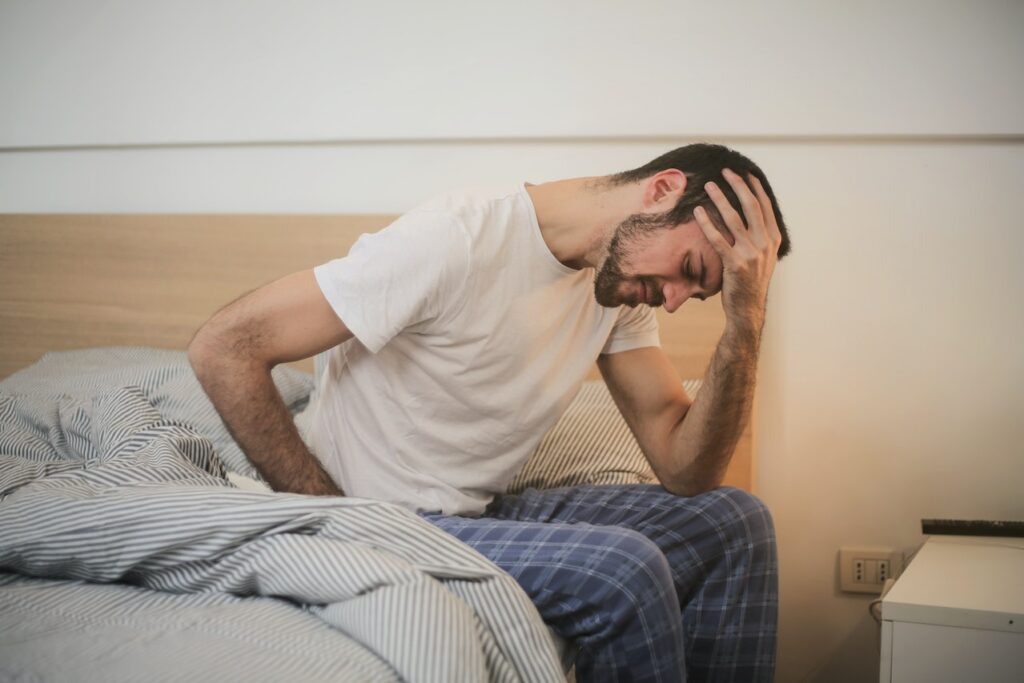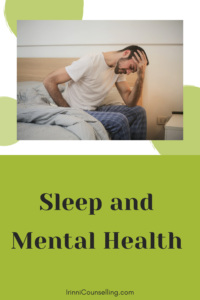
Sleep and Mental Health
You may know from your own experience that sleep and mental health go hand-in-hand and when one declines it can affect the other and create a catch-22 situation.
That’s because poor sleep and mental health problems are closely interlinked. There is a reciprocal relationship between them, meaning that poor sleep can contribute to the development or worsening of mental health problems, and mental health problems can lead to poor sleep.
How poor sleep affects mental health
Poor sleep affects mental wellbeing by disrupting the regulation of emotions. The prefrontal cortex, a part of the brain responsible for regulating emotions, problem-solving, and impulse control, is particularly sensitive to sleep deprivation.
When we don’t get enough sleep, the prefrontal cortex may not function properly, leading to increased negative emotions and decreased ability to regulate them. This can cause a vicious cycle where poor sleep leads to negative emotions and vice versa.
Poor sleep can also contribute to the development or worsening of anxiety disorders. Studies have shown that people experiencing insomnia have an increased risk of developing anxiety disorders and that sleep deprivation can trigger anxiety symptoms.
Research has also shown that people experiencing insomnia are two to three times more likely to develop depression. The relationship between sleep and depression is complex, but it’s believed that sleep deprivation affects the regulation of serotonin, a neurotransmitter that regulates mood.
Poor sleep can impair cognitive functioning, affecting memory, focus, and decision-making. This can lead to increased stress and frustration, which can contribute to the development of anxiety and depression.
Furthermore, sleeping problems can also lead to physical health problems such as inflammation, obesity, and cardiovascular disease, which in turn can impact mental health problems.
Lack of sleep also leads to poor lifestyle choices, such as eating high-sugar foods or not exercising.
Related article: Gut Health and Mental Health: Can You Eat Your Way to Wellness?
How poor mental health affects sleep
On the other hand, mental health problems can also lead to poor sleep.
If you’re experiencing anxiety, depression, bipolar disorder or post-traumatic stress disorder (PTSD) you may experience insomnia, which can further exacerbate mental health symptoms.
The stress and negative thoughts associated with mental health problems can also make it difficult to fall asleep or stay asleep.
Manic episodes and medication used to treat mental health problems can both interfere with normal sleep patterns too.
Another sleep problem that can be caused by mental health conditions is hypersomnia.
Hypersomnia is excessive sleepiness during the day and prolonged sleep at night. It is a common symptom of depression and can also be caused by the use of certain medications.
Nightmares and night terrors are also common among people with mental health conditions.
Nightmares are vivid and disturbing dreams that often wake you up, while night terrors are sudden awakenings accompanied by intense fear or anxiety. These sleep disturbances can be caused by PTSD, anxiety disorders, and other mental health conditions.
Mental health problems can also affect your sleep quality, such as restless or fragmented sleep with frequent awakenings, difficulty falling back asleep, or a decreased amount of deep sleep.
How trauma affects sleep
Trauma (current or past) can cause disruptions in the autonomic nervous system, which can lead to sleep problems such as insomnia and nightmares.
The autonomic nervous system is responsible for regulating many bodily functions, including heart rate, respiration, and digestion.
It is composed of two branches: the sympathetic nervous system, which is responsible for the body’s “fight, flight, freeze” response, and the parasympathetic nervous system, which is responsible for the body’s “rest and digest” response.
These disruptions in the autonomic nervous system lead to an overactive sympathetic nervous system and a suppressed parasympathetic nervous system, causing increased levels of stress hormones, such as cortisol, which can make it difficult to fall or stay asleep.
People with a history of trauma may also experience hypervigilance, a state of increased alertness, which can make it difficult to relax and fall asleep.
Related article: Dealing with Childhood Trauma in Adulthood
Regulating your sleep and mental health
As you can see, poor sleep and mental health problems are closely interlinked, so addressing one can have a positive impact on the other.
Improving sleep hygiene can help improve sleep and mental health:
- Have regular bed and wake times
- Sleep in a cool, dark room
- Avoid caffeine, sugar, and large meals for several hours before sleep
- Avoid using devices in the evening or use blue light blocking glasses or night mode settings
Similarly, seeking treatment for mental health problems can help improve sleep.
I offer counselling in an environment where you feel comfortable, safe and relaxed, giving you the opportunity to explore your problems.
My focus is on psychotherapeutic counselling which concentrates on you as a whole person (mind, body and soul) in a holistic way.
If you would like to find out more about counselling or book a session, get in touch for an informal chat.
